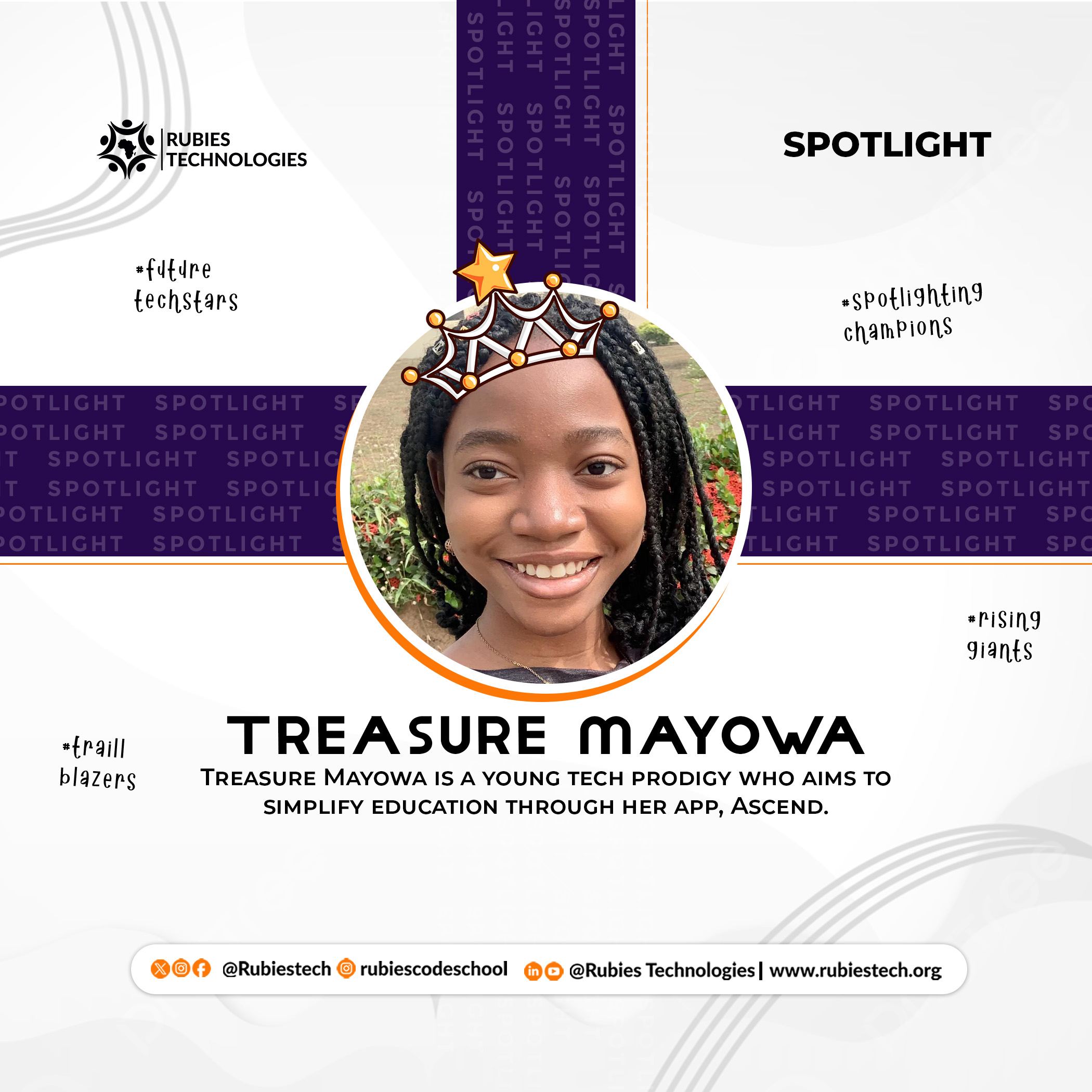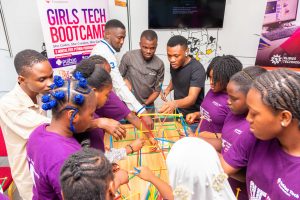At just 16, Treasure Mayowa isn’t your average teenager. While many her age are busy navigating social media and schoolwork, Treasure is harnessing the power of technology to tackle real-world problems. Driven by a deep passion for innovation and a desire to make a positive impact, she’s already carved her name in the education sector with her groundbreaking AI-powered platform, Ascend. Excerpts…)
Can we know you?
My name is Treasure Mayowa, a 16-year-old student currently enrolled in the JUPEB program. I’m passionate about technology and its potential to solve problems. I believe it’s a tool we can use to accelerate progress in Nigeria and beyond. I’m already seeing exciting applications of technology in many ways, and I’m thrilled to be actively involved in harnessing its potential. This passion has led me to immerse myself in various opportunities and build numerous projects, like the one you stumbled upon. I’m making my own impact in my little way using the resources I have at my disposal.
At what age did you get involved in tech?
I would say I started around 12 or 13 years old, during the 2020 lockdown. Like everyone else, I was stuck at home. Before then, I had dabbled in learning how to code, and with all that free time, I decided to dive deeper. I started with HTML and kept exploring, taking up new programming languages and frameworks. I’ve been continuously improving and learning ever since.
How were you able to couple with school and coding?
Back then, I was in SS1, and school definitely took priority. I was a boarding school student, and after the lockdown, I wasn’t able to access everything needed for coding when I returned to school. So, coding was put on hold until the holidays, when I could pick it up again. Juggling coding and school wasn’t really an option at the time since coding resources weren’t available at my boarding school.
How many programming languages do you know?
Currently, I know Javascript, Python, and C. Additionally, I’m picking up frameworks like React, React Native, Django, Flask, and frameworks for using databases like MongoDB and PowerBase.
Did you have a physical place to learn or online?
Most of my learning journey has been online, where I’ve been teaching myself and utilizing various resources. One crucial element that helped me was building projects. It’s easy to want to learn programming languages in a linear fashion, one by one, like in school. While that’s perfectly fine, building projects was what truly helped me. Even if I didn’t know how to build a project completely, the little knowledge I had allowed me to seek solutions on Google. When I found solutions, I realized they could be applied to other aspects of the programming language, allowing me to grasp basic knowledge and have tangible projects to showcase my learning. So, I believe self-learning and building projects were the key methods I used to learn programming languages.
How were your parents’ reactions when you started?
Initially, my parents, especially my dad, were very supportive. He was happy that I was using the lockdown productively. However, there was a slight clash because of online classes during that period. Despite that, my dad encouraged me to set my priorities. In general, my parents were excited to see me doing something productive. I was also able to keep them updated on my journey. It’s one thing to tell them you’re coding while using your laptop, but I also showed them some of the projects I was working on. Even though my dad didn’t fully understand the technical aspects, seeing tangible results of my work was more impactful than just explaining it.
Tell us about some of the projects you have worked on?
Let me start with the older ones and move to the more recent ones. In 2022/2023, I created a mobile app to promote climate education. This was a project I worked on with a team for a specific competition. We conducted a survey to confirm our assumptions, although we could have deduced some things without it. The survey revealed a limited understanding of climate change among the public in Nigeria. When you ask people there what climate change is, only a few grasp the concept, leading to a lack of attention to the issue. Climate change is real, with its effects visible in various parts of the world, including Nigeria. The devastating floods in 2021, the worst in the country’s history, killed thousands and displaced millions. These are just some examples of the effects of climate change we’re witnessing. This urgency drove us to spread climate change education in Nigeria. After our survey, we identified a gap in climate education and decided to build a mobile app that not only educates but also empowers people with knowledge on what they can do about it. I served as the programmer for the project and built the entire app. We submitted it for the competition and reached the quarter and it was a big motivation for me.
There is one I did recently, late last year. This project focused on promoting sustainable agriculture. When it comes to climate change, the agricultural sector is one of the biggest sufferers and contributors. It goes both ways. One way it contributes is through farming techniques. Many techniques used today are unsustainable for the land and contribute to climate change. Farmers use these techniques because they’re familiar and what they know.
So, we need to promote techniques that improve soil nutrients and don’t contribute to climate change. We need to spread awareness, but also help farmers. This is where organizations, NGOs, and people who want to promote sustainable agriculture can come in.
One challenge is reaching farmers, who often lack high-end phones or consistent internet access. This makes it harder to reach and spread information to them. My project was an AI-powered tool called “Agrisage” that sends automated messages or calls to farmers in such regions, reaching them even with low-end phones. The AI responds to their messages and calls, offering personalized tips on how to be sustainable based on their specific situations.
Let’s talk about Ascend. What prompted you to develop it?
As someone who went through the Nigerian educational system, I’ve seen its flaws, one of the biggest being teacher quality and teaching. During secondary school, I relied heavily on self-study because in some subjects, even though teachers tried, it wasn’t enough. This was a shared problem with my classmates. A lot of things I had to learn on my own.
While self-study is possible, a good teacher’s explanations are irreplaceable. I missed out on that. Even at my private school, the problem existed. Imagine those without that opportunity. I wanted to improve teacher quality. Before starting, I researched, spoke to teachers, and visited schools to understand factors influencing teacher quality. Low salaries are a major demotivator. Even passionate teachers struggle to make ends meet and have to take on other jobs, impacting their performance.
High workload is another issue. Schools underpay teachers while expecting them to handle many classes and students without enough resources. Additionally, many teachers lack proper training to meet student needs and use effective methods.
Considering all these, I built Ascend, a web application that helps teachers improve their skills and learning outcomes. It has three main features: courses, resources, and tools.
The courses section is still under development due to juggling school and other responsibilities. One course I’m building uses AI for teaching. AI is a buzzword now, like applications like ChatGPT. This course aims to educate teachers on using AI tools to improve their teaching.
The resources section includes educational YouTube videos for teachers with practical tips, and teaching aids and guides to help them explain better and visualize topics for students.
Finally, the tools section has AI-powered tools I built to reduce teachers’ workload. For example, the assessment generator helps teachers set questions and marking guides faster, saving them time.
If given another opportunity, what problem in Nigeria would you tackle?
I’m interested in solving problems in the healthcare space. In my other projects, I’ve tried to touch various sectors with issues I’ve faced firsthand and want to help with. For example, one project addressed agriculture, and Assend focuses on education. I definitely want to work on healthcare delivery.
Where do you see yourself in the next five years?
I should be done with university then. I see myself working with a company in the social impact and tech space. I’d like to spend time gaining experience with a company or its owner before starting something on my own. I want to continue working on social impact in tech, building projects, solving problems, and helping people.
What language did you find most difficult?
Interestingly, it has to be JavaScript. I learned it first in 2020, but then school and assignments interrupted my learning. Coming back, I couldn’t remember as much, and it was a struggle to refresh my memory and relearn. However, by building projects and practicing, I overcame it.
What advice do you have for young people?
Start early! As a young person, you have more energy and time than you think. We say we’re busy, but we have more time than adults with jobs. Start early, explore your curiosity. If you want to build a game, start building it right away! There are many resources online and offline. If you’re interested in something, keep digging and exploring. There’s a whole world in the tech space waiting for you.
What advice do you have for parents?
Trust the process with your child. Be encouraging. When I started, knowing my parents supported me motivated me to keep going. Parents should be encouraging and patient.
What’s your view on Artificial Intelligence?
My views on AI are that it’s ever-evolving and has huge potential. This potential was part of my motivation to learn how to code. I believe AI has a lot to offer, even though I know it also has potential downsides. People have discussed the possibility of AI taking jobs and replacing humans, as well as concerns about AI sentience. However, the key is to manage these negatives so they don’t overshadow the positives. Companies can do this by implementing guidelines in their work with AI, ensuring it doesn’t completely replace human roles. Ultimately, we need to communicate that AI is an enabler, not a replacement for human work.
Do you know any Nigerian kid doing well in the tech space and you’ll like us to spotlight? Kindly contact olalekan@rubiestech.org or call +2347015016330, +2348137197307



